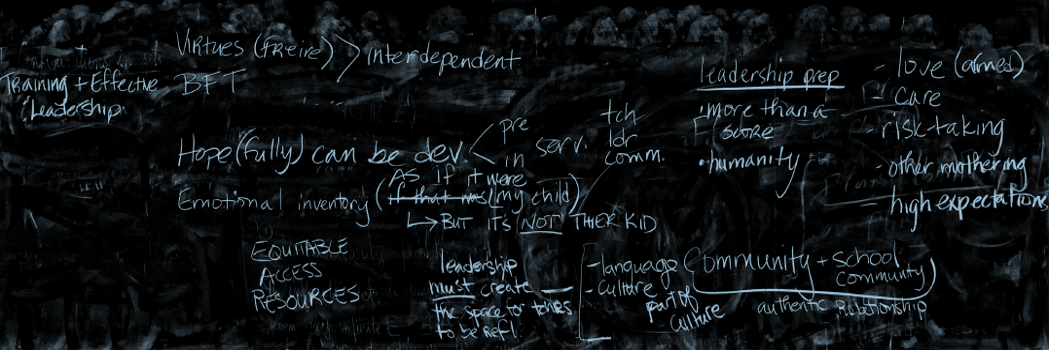One thought that kept surfacing as I read this week: Love is not neutral, it is and must be an act of justice. I reflect deeply on Freire’s words “Whether or not we are willing to overcome slips or inconsistencies, by living humility, lovingness, courage, tolerance, competence, decisiveness, patience-impatience, and verbal parsimony, we contribute to creating a happy, joyful school” (Freire, 1998, p. 212). Freire has always made me return to what it means to be human: our humanity. What has become of love in the capitalized, masculinized, white supremacist world has distanced greatly from a love that is core to our humanity. Each of the other readings this week reflect and take further the contributions of an epistemology, an ideology, and way of thinking that Freire grounds. Miller and colleagues (2011) argue and describe the ways in which love, hope, and humility are embedded within progressive pedagogical practice. And in Rivera-McCutchen (2019), the armed love of Principal Bowman in resisting the high stakes testing and Principal Bloomberg resisting racist resource allocation, truly confirms the notion that love must be a commitment towards resisting injustice. In reflecting on teaching practices and my own schooling of course, the seemingly political neutral “love” of teacher is never truly neutral, and wasn’t really love. I wonder really how neutrality is a trope that educators in my suburban town cling to in their teaching. I think a lot about what the conversations that we have in our class would mean to them? Would such conversations push them to conceive their role as a teacher differently? What happens when we begin to include the voices of suburban white middle aged women teachers in these conversations to developing radical care in the classroom? If they are primarily white teachers serving predominantly white schools, how will they realize that the work of critical care extends to their responsibility to deconstruct harmful assumptions of Anti-Blackness and capitalism that their white students are mostly likely entrenched in?
Radical Care Sp21
Teaching & Leading for Justice in Schools




Hi Sohini,
Your comments – this week and last – have really resonated with me, especially the way you explicitly name how capitalism, patriarchy, and white supremacy delusion/anti-Blackness work together to sever our innate human capacities for radical love, empathy, connection, and joy. I agree with you that politically “neutral” teaching, and politically “neutral” love is neither neutral/apolitical, nor love. And I really appreciated the questions you pose at the end of your post.
Your questions make me think about the ways that “anti-racist” teaching is often talked about in education reform discourse as something for Black children only, perpetuating racist and deficit-frameworks about “achievement gaps” and how to get students to “care” or “engage” with the learning. But just as you said, radical care and critical pedagogies are essential in classrooms where White students are – to disrupt the the “harmful assumptions of Anti-Blackness and capitalism” that you name, that students learn through their “neutral” politics and “neutral” curricula that are in fact steeped in violent politics of whiteness and anti-blackness. “Neutrality” to me is one of the essential tools of upholding systems of oppression.